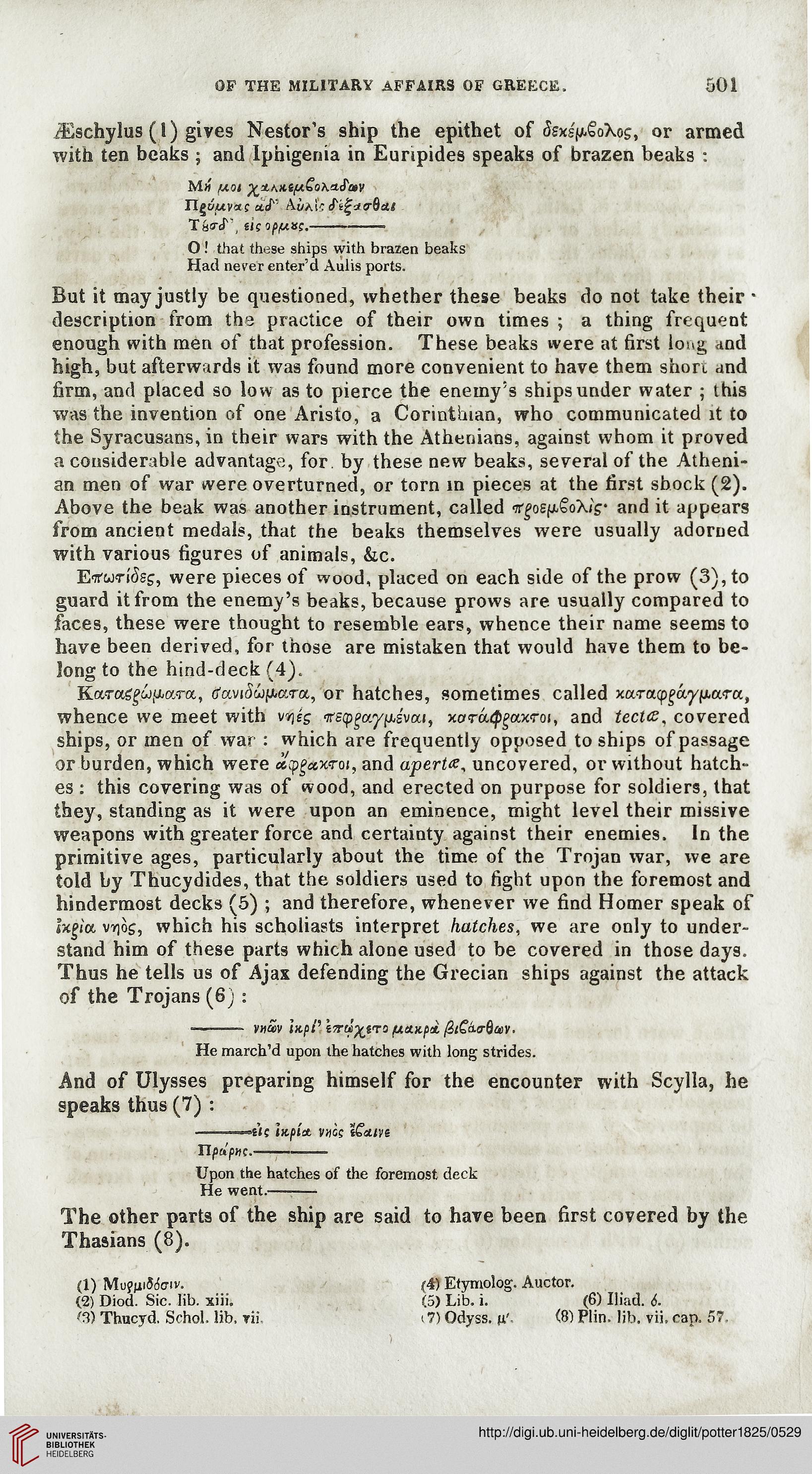OP THE MILITARY AFFAIRS OF GREECE.
JSschylus (I) gives Nestor's ship the epithet of Ssxs^oKog, or armed
with ten beaks ; and Iphigenia in Euripides speaks of brazen beaks :
Ta^cT", sic ofi/mn;.-——
O ! that these ships with brazen beaks
Had never enter'd Aulis ports.
But it may justly be questioned, whether these beaks do not take their •
description from the practice of their own times; a thing frequent
enough with men of that profession. These beaks were at first long and
high, but afterwards it was found more convenient to have them short and
firm, and placed so low as to pierce the enemy's ships under water ; this
was the invention of one Aristo, a Corinthian, who communicated it to
the Syracusans, in their wars with the Athenians, against whom it proved
a considerable advantage, for by these new beaks, several of the Atheni-
an men of war were overturned, or torn in pieces at the first shock (2).
Above the beak was another instrument, called te^s^oXis' and it appears
from ancient medals, that the beaks themselves were usually adorned
with various figures of animals, &c.
Eirwriosg, were pieces of wood, placed on each side of the prow (3), to
guard it from the enemy's beaks, because prows are usually compared to
faces, these were thought to resemble ears, whence their name seems to
have been derived, for those are mistaken that would have them to be-
long to the hind-deck (4).
KaTa££w,aa<ra, tfavi^wffcara, or hatches, sometimes called xo.ra.y^dypa.ra.,
whence we meet with vyis ireygctypivcti, xardtp^axroi, and tecl<£, covered
ships, or men of war : which are frequently opposed to ships of passage
or burden, which were acpgccxrm, and apert<e, uncovered, or without hatch-
es : this covering was of wood, and erected on purpose for soldiers, that
they, standing as it were upon an eminence, might level their missive
weapons with greater force and certainty against their enemies. In the
primitive ages, particularly about the time of the Trojan war, we are
told by Thucydides, that the soldiers used to fight upon the foremost and
hindermost decks (5) ; and therefore, whenever we find Homer speak of
rxg/a vt)o£, which his scholiasts interpret hatches, we are only to under-
stand him of these parts which alone used to be covered in those days.
Thus he tells us of Ajax defending the Grecian ships against the attack
of the Trojans (6; :
He march'd upon the hatches with long strides.
And of Ulysses preparing himself for the encounter with Scylla, he
speaks thus (7) :
'tie Infict v«o? tSam
Tlpttpm.--
Upon the hatches of the foremost deck
He went.-
The other parts of the ship are said to have been first covered by the
Thasians (8).
(4) Etymolog. Auctor.
(5) Lib. i. (6) Iliad. 6.
17) Odyss. u' (8) Plin. lib. vii, cap. 57.
(1) Mo?j«5<$c>v.
(2) Diod. Sic. lib. xiii.
fW Thucyd. Schol. lib. rii.
JSschylus (I) gives Nestor's ship the epithet of Ssxs^oKog, or armed
with ten beaks ; and Iphigenia in Euripides speaks of brazen beaks :
Ta^cT", sic ofi/mn;.-——
O ! that these ships with brazen beaks
Had never enter'd Aulis ports.
But it may justly be questioned, whether these beaks do not take their •
description from the practice of their own times; a thing frequent
enough with men of that profession. These beaks were at first long and
high, but afterwards it was found more convenient to have them short and
firm, and placed so low as to pierce the enemy's ships under water ; this
was the invention of one Aristo, a Corinthian, who communicated it to
the Syracusans, in their wars with the Athenians, against whom it proved
a considerable advantage, for by these new beaks, several of the Atheni-
an men of war were overturned, or torn in pieces at the first shock (2).
Above the beak was another instrument, called te^s^oXis' and it appears
from ancient medals, that the beaks themselves were usually adorned
with various figures of animals, &c.
Eirwriosg, were pieces of wood, placed on each side of the prow (3), to
guard it from the enemy's beaks, because prows are usually compared to
faces, these were thought to resemble ears, whence their name seems to
have been derived, for those are mistaken that would have them to be-
long to the hind-deck (4).
KaTa££w,aa<ra, tfavi^wffcara, or hatches, sometimes called xo.ra.y^dypa.ra.,
whence we meet with vyis ireygctypivcti, xardtp^axroi, and tecl<£, covered
ships, or men of war : which are frequently opposed to ships of passage
or burden, which were acpgccxrm, and apert<e, uncovered, or without hatch-
es : this covering was of wood, and erected on purpose for soldiers, that
they, standing as it were upon an eminence, might level their missive
weapons with greater force and certainty against their enemies. In the
primitive ages, particularly about the time of the Trojan war, we are
told by Thucydides, that the soldiers used to fight upon the foremost and
hindermost decks (5) ; and therefore, whenever we find Homer speak of
rxg/a vt)o£, which his scholiasts interpret hatches, we are only to under-
stand him of these parts which alone used to be covered in those days.
Thus he tells us of Ajax defending the Grecian ships against the attack
of the Trojans (6; :
He march'd upon the hatches with long strides.
And of Ulysses preparing himself for the encounter with Scylla, he
speaks thus (7) :
'tie Infict v«o? tSam
Tlpttpm.--
Upon the hatches of the foremost deck
He went.-
The other parts of the ship are said to have been first covered by the
Thasians (8).
(4) Etymolog. Auctor.
(5) Lib. i. (6) Iliad. 6.
17) Odyss. u' (8) Plin. lib. vii, cap. 57.
(1) Mo?j«5<$c>v.
(2) Diod. Sic. lib. xiii.
fW Thucyd. Schol. lib. rii.





